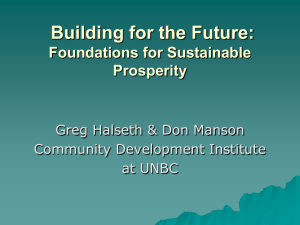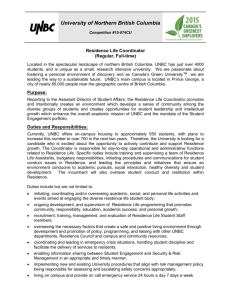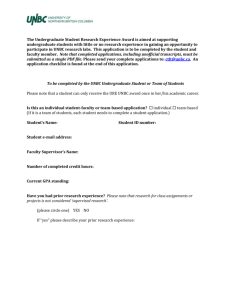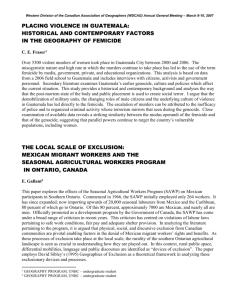Northern Forest Products
advertisement
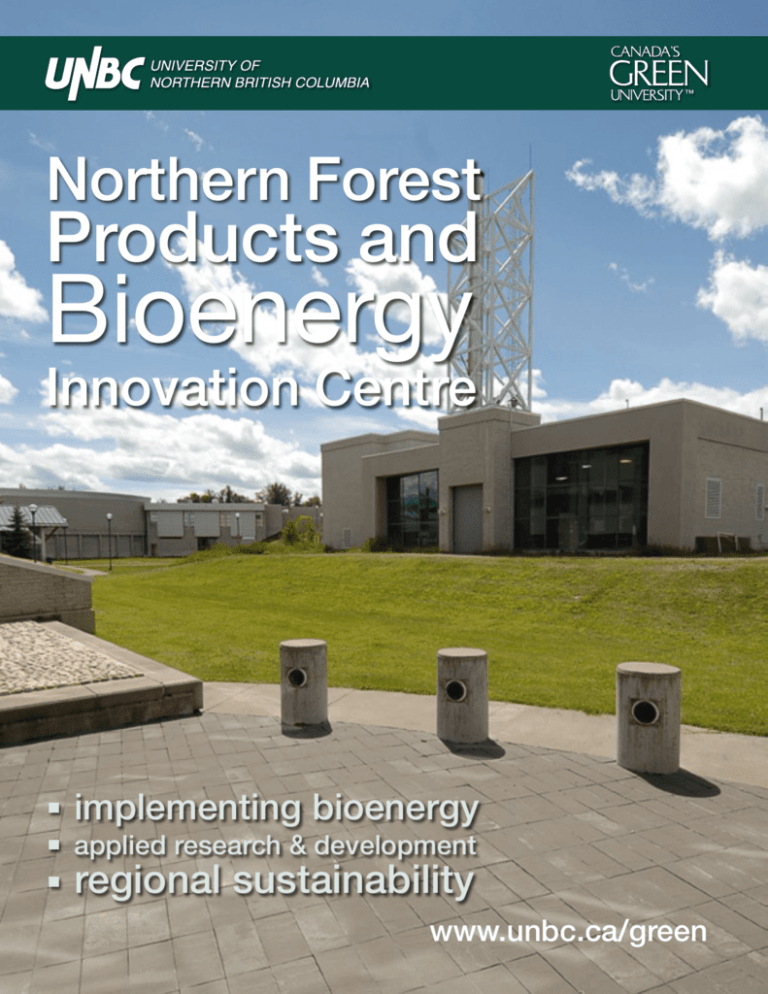
Northern Forest Products and Bioenergy Innovation Centre implementing bioenergy applied research & development regional sustainability www.unbc.ca/green What Green Means Research Campus Living It UNBC has a diverse range of environmental degree programs and has one of the highest proportion of students in naturebased degree programs in Canada. 11 of UNBC’s 13 research chairs focus on environmental issues, a higher proportion than any other Canadian university. We also have research stations throughout northern BC. to Us Environmental In northern British Columbia, it’s the environment that sustains communities, health, cultures, and the economy. This is just one reason why UNBC is the top choice for students and faculty interested in studying the environment up close and personal – rather than from a distant concrete jungle. sustainability has emerged as one of the defining issues of our time. UNBC intends to be British Columbia’s model for green energy and the first university in Canada to implement major power plant measures to become carbon neutral and operate on renewable energy. UNBC is uniquely positioned to join with governments, communities, the private sector, First Nations, and our educational partners to develop local solutions to these challenges by integrating campus operations, education, and research on a single site. Teaching UNBC is proposing a bioenergy program that will reduce greenhouse gas emissions and fossil fuel consumption on the Prince George campus. The program will help the University meet its current and future energy needs, reduce or eliminate our greenhouse gas footprint, and reduce energy costs while contributing to R&D, training, student/public education and the development of bioenergy projects and demonstration opportunities for northern communities. Is there another region in North America with greater wealth and diversity in natural resources? Our environment provides trees, minerals, electricity, and natural gas. It also sustains worldclass recreational pursuits, tremendous fish and wildlife populations, and agriculture. As Canada’s Green University, we’re helping our region be a model for the country – and indeed, the world – leading the way to a more sustainable future for all. UNBC’s Prince George campus is a showpiece for the use of natural materials in architecture and none of the buildings is taller than the surrounding trees. The Quesnel campus was built to a LEED Gold standard. Students, staff, and faculty are passionate about the environment. Students recently joined the U-Pass program with the highest approval vote in BC and they operate a popular compost demonstration garden. Phase 1: Prince George Campus operations UNBC, Western Economic Diversification, and the Canadian Wood Pellet Association are conducting a pilot project investigating the use of wood pellets in a commercial/institutional heating application. Toward that end, installation of a 1.4 million BTU pellet burning system in the I.K. Barber Enhanced Forestry Lab at UNBC is underway. This project is fully funded at $517,000. Public education is integral to our plan. The University is creating a Green University Centre in the Winter Garden that will serve as an education hub for the University community about bioenergy, energy conservation, climate change, waste reduction, recycling, transportation, and more. $250,000 in funding is required for the renovation and an endowment fund to support student activities. The personnel located in the Centre are being funded by BC Hydro, the Pacific Institute for Climate Solutions, and UNBC. UNBC has signed a letter of intent with Nexterra Energy, a British Columbia bioenergy company, to install a biomass gasification system that will provide heat to the core campus buildings and offset an estimated 85% of current natural gas consumption. This 15-million BTU fixed-bed gasification project has attracted $5-million from Public Sector Energy Conservation Agreement (PSECA) funding and $3.5million from the Government of BC’s Innovative Clean Energy (ICE) fund – just over half of the $15-million estimated total project cost. Project completion can be achieved in the third quarter of 2010 if the remaining $6.5 million in funding is received in the first quarter 2009. Existing Power Plant We’re Ready Now The Prince George campus is uniquely positioned to be a showpiece for renewable energy. All of the core campus buildings are connected to the Power Plant via a utility corridor for the efficient distribution of heat and power. The Power Plant currently serves more than 56,000 square metres of space in multiple buildings. Currently, UNBC consumes nearly 85,000 gigajoules of natural gas per year to heat the campus. A biomass energy system at the University could offset up to 4,000 tonnes of annual greenhouse gas emissions. Phase 3: Community Installations Phase 2: Applied Bioenergy and Forest Products Research This phase of the project is to develop a research centre that will have two parts: The Sustainable Northern Bioenergy Centre will provide opportunities for integrated, interdisciplinary research on the social, economic, political, biological, health, and technological aspects of bioenergy, as well as training opportunities for technologists, potentially in conjunction with the College of New Caledonia. The Northern Forest Products Diversification Centre will integrate research and teaching on resource policy and economics, global markets and trade, emerging markets, and business development with product innovation and development. This component would focus on 1 ) the regulatory environment, as well as socioeconomic parameters that enhance or limit our capacity to add value to forest resources; and 2) increasing our involvement in wood product development, such as value-added wood products, innovative uses of dead wood, and by-products from the pulp mill industry. The research centre will operate a bioenergy pilot plant at close to commercial scale, and it will be critical for the development of knowledge and the training of highly qualified personnel. The pilot plant will also serve as a demonstration unit regarding the production of value-added products from biomass. All of these functions will contribute to the economic diversification of forest-dependent communities. The ultimate objective of UNBC’s bioenergy and forest products program is to serve as a new knowledge source for British Columbia communities that are aiming to diversify their resource-based economies. Using the campus as a showpiece and adding the research component in phase two, this project is designed to demonstrate British Columbia technology for implementation in northern and First Nations communities and utilize mountain pine beetle biomass in the creation of energy. This practical implementation phase will involve applying operational insights and research information to communities of varying sizes and assisting them in creating solutions to environmental and economic challenges. BC Premier Gordon Campbell was in Prince George in 2008 to officially launch the BC Bioenergy Network. The 2009 Northern Economic Summit again highlighted local opportunities for bioenergy research and development at UNBC. With an established forest industry infrastructure – as well as the challenge of managing forests infected with the pine beetle – northern BC is an ideal location for implementing bioenergy opportunities at the community level. In the UNBC Power Plant, Chief Engineer Doug Carter describes to Ministers Neufeld, Bond, and Chong how simply an alternative energy system could connect into UNBC’s existing heating and cooling system. The scale of the UNBC system would make it an appropriate model for northern communities. It is in remote Aboriginal communities where the needs for energy security are perhaps most obvious. With connections to First Nations throughout northern BC and beyond, UNBC is eager to help ensure that the results of our bioenergy program are applied widely. Northern BC: A knowledge-based, resource economy connected to the world. The University has the potential to be a world class showcase of BC clean energy technology. The first of its kind at a Canadian university, it will be a catalyst for applied research and economic development. It will directly support provincial and national priorities related to climate action, renewable energy, research, northern economic diversification, valueadded wood products, and the expansion of BC’s knowledgebased economy. Contacts Phase 1: Campus Operations Eileen Bray, VP Administration (250) 960-5541 braye@unbc.ca Phase 2: Research Gail Fondahl, VP Research (250) 960-5856 fondahlg@unbc.ca 3333 University Way Prince George, BC V2N 4Z9
